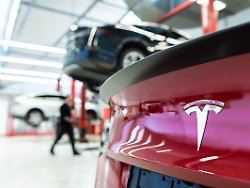The auto industry posted heavy losses in August. For Tesla, on the other hand, things went very well, the electric car manufacturer increased its sales many times over. Bonuses are fueling the electric boom: a quarter of the newly registered cars now have an electric drive.
Car sales in Germany slumped by 20 percent in August – despite higher purchase premiums for electric cars and the reduction in VAT. Commercial buyers in particular held back in the Corona crisis, as the Federal Motor Transport Authority announced. Sales of company cars, for which VAT ultimately plays no role, plummeted by 26 percent compared to the same month last year. Commercial vehicles made up almost two thirds of the 251,000 newly registered cars. In July, the overall decline in sales of five percent was comparatively moderate because customers had waited until the VAT cut before making planned purchases.
A quarter of the newly registered cars now have an electric drive. The number of fully electric cars tripled within a year to 16,000 and thus represented a good six percent of new registrations. The number of hybrid vehicles doubled to 46,000 and thus represented 18 percent of the new vehicles sold. Sales of pure gasoline vehicles, on the other hand, fell 39 percent to 118,000. The number of cars with pure diesel drive dropped by 28 percent to 69,000.
"The effect of the VAT reduction fizzled out," said car expert Peter Fuß from management consultancy EY. The US electric car manufacturer Tesla, which was the only brand to record sales growth in Germany so far this year, benefited in particular from the development. With 2,800 cars in August, Tesla almost six-fold its sales in August. The company's market share was a good one percent. Among the domestic suppliers, the BMW brand, which relies heavily on hybrid vehicles, performed best. BMW sales climbed by 15 percent within a year. VW lost 17 percent, Mercedes just under four percent.
In politics, the discussion about changing funding practice is gaining momentum. While Economics Minister Peter Altmaier is thinking about allowing car buyers to use several subsidy programs for electric cars at the same time, Bavarian Prime Minister Markus Söder is demanding that low-CO2 combustion engines should also be subsidized. However, Chancellor Angela Merkel rejected Söder. "Personally, I believe our stimulus plan is now round, that we have taken the right measures," she said. The VAT cut included in the package also lowers the price of cars with internal combustion engines – "in this respect, I don't see any need for additional measures".
.
